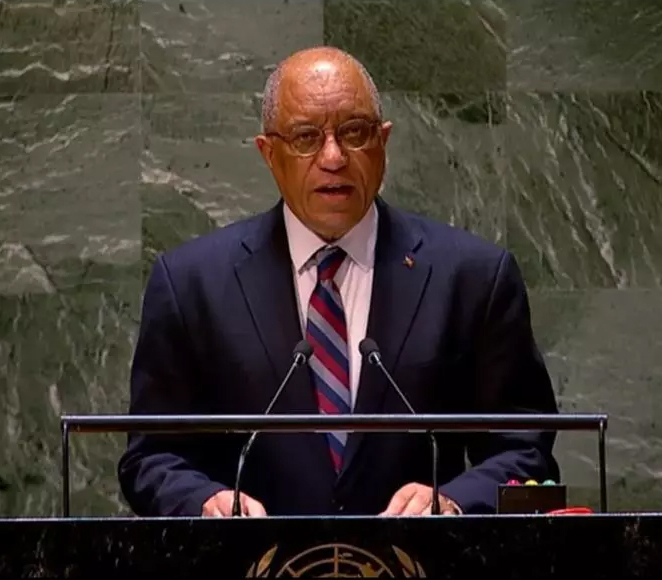
Ambassador Francisco da Cruz -DR
Luanda- Angola's permanent representative to the United Nations, Francisco José da Cruz, said this Thursday, in New York, that the modernization of the transport and logistics network is one of the country's main priorities to capitalize on Angola's geographical location.
As part of the priorities, he highlighted the new international airport in Luanda, opened in November 2023, which should position the country as a regional aviation center and a powerful engine for the economy, increasing its attractiveness and potential for commercial and tourist purposes.
The diplomat was speaking at the informal dialogue on Building Global Resilience and Promoting Sustainable Development through Infrastructure Connectivity, as part of Sustainability Week, which runs until Friday, in that North American city.
He reported that there are also improvements in connections with neighboring landlocked countries, such as Zambia and the southern part of the Democratic Republic of Congo (DRC), with the Lobito Corridor, a 1,344-kilometer railway that will connect the three countries to the world through from the Angolan port of Lobito.
He said that upon completion, the Lobito Corridor will become an important rail transport link in Sub-Saharan Africa and will improve the productivity and competitiveness of companies, promoting economic development and increasing foreign direct investment in the region.

He added that the Lobito Corridor is yet another example of how Angola is playing an active role in implementing the African Union Program for Infrastructure Development in Africa (PIDA) to build a solid and reliable infrastructure network, which will improve intra- and inter-African exports, as well as transform the country into one of Southern Africa's trade and development centers.
During his intervention, Francisco José da Cruz emphasized that the executive has been implementing an ambitious infrastructure plan within the scope of the National Development Plan 2023-2027, which includes regulatory reforms, incentives for investors and innovative public-private partnerships.
This program, he maintained, aims to accelerate economic growth, improve transport, increase energy security, attract international investment and improve the livelihoods of the Angolan people, thus contributing to the achievement of the United Nations 2030 Agenda for Sustainable Development, especially o SDG 9: build resilient infrastructure, promote inclusive and sustainable industrialization and promote innovation.
Africa faces great opportunities and challenges
Speaking on behalf of the African Group, the diplomat highlighted that, with a projected population of 2.5 billion people by 2050, Africa faces great opportunities and challenges.
He noted that the inadequacy of infrastructure networks annually costs the continent around 2% of its GDP, highlighting the fact that eleven of the 20 fastest growing economies in the world in 2024 are expected to be in Africa, making it vital to concentrate infrastructure development to leverage this projected economic acceleration, with average growth estimated at 3.8% in 2024.
Regarding the Program for Infrastructure Development in Africa (PIDA), he said that this strategic framework gives priority to infrastructure projects and promotes regional integration, having benefited from more than US$65 billion in funding commitments from AU member states.
This fact, he highlighted, illustrates Africa's dedication to addressing infrastructure deficits as a crucial aspect of sustainable development.
He made it known that, currently, investment in this sector is 4% of GDP, but it is expected to increase, filling the infrastructure deficit, it is estimated that GDP growth could increase by 2 percentage points annually, which would contribute to sustainable development and economic resilience.
“The AU Agenda 2063 places infrastructure connectivity at the forefront of its objectives, with a focus on interconnectivity between regions and sectors”, he highlighted.
On the occasion, Francisco José da Cruz also informed that the African Union (AU) is making efforts to leverage infrastructure connectivity, in order to unlock Africa's economic potential
It understands that this will only be possible through initiatives such as the Continental Free Trade Area (AfCFTA), an initiative that aims to create the largest single market in the world.
He considered it important to address the main challenges, such as inadequate financing, regulatory barriers and restrictions on institutional capacity, to take advantage of the dynamics of these initiatives, highlighting positive efforts, such as the establishment of the Continental Free Trade Area Adjustment Mechanism and the Africa50 infrastructure investment. ART
Contact: Customer service
Phone: +86-18616961226
E-mail: Panafrican@foxmail.com
Add: Room B3.19/F,Tung Lee Commercial Building,91-97 Jervois Strieet,Sheung Wan,Hong Kong